 richterfoto
richterfotoState of the EU address
Unofficial European election campaign kick-off.
IF – 09/2023
On 14 September, the President of the European Commission, Ursula
von der Leyen gave her annual State of the Union address (EU) at the
European Parliament in Strasbourg, her last before the upcoming European
elections in June 2024. It was anything but an ordinary speech. Seldom has
Europe found itself in such a fragile political environment. Not surprisingly,
the most pressing issues were reflected in Von der Leyen's address – the
ongoing Russian war of aggression against Ukraine, the climate crisis, the
handling of asylum and migration, and finally Europe's role in the world.
Green, greener and clearly European
Alongside this was the commitment to the major political project of
the European Green Deal and its
implementation. Europe is to become climate-neutral by 2050. The ongoing fight
against climate change-related disasters and the goal of transforming the
European economy and industry is not only a central task for the current
European Commission. It will remain as such in the next legislative period. Von
der Leyen hopes that this will lead to more investment by Member States,
economic growth and the creation of new jobs. She does not find approval for
this everywhere, especially not among the MEPs of her own parliamentary group
in Brussels, the European People's Party (EPP). The latter increasingly
attracted attention by voting against its President on individual initiatives
of the European Green Deal. Von der Leyen has not (yet) been swayed by this.
Situation of people in the EU
It remained conspicuous that Von der Leyen neither presented
solutions for the continuing inflation, nor announced aid plans for EU
citizens, nor did she reveal a vision for the social situation. It is not only
people on low incomes who are suffering from the rising costs of food, housing
and mobility; people on middle incomes are also clearly feeling the heat.
Although she mentioned the importance of the implementation of the
European Pillar of Social Rights, but it was not
substantive. Rather in passing, she mentioned that the development and expansion of the European Health Union will continue to
be pursued in the coming years.
Speculation on top posts
However, whether Von der Leyen still wants to
have a say at the top rung of the European Commission and seeks another
legislative term is currently still open. First, she needs the support of
France and Germany to enter the election as a strong candidate by the heads of
state and government. But she could also run a classic European election
campaign in her home state of Lower Saxony in order to secure at least a
mandate as an officially elected MEP. She herself has not yet positioned
herself. So far, there are no opposing candidates for the top EU job.
